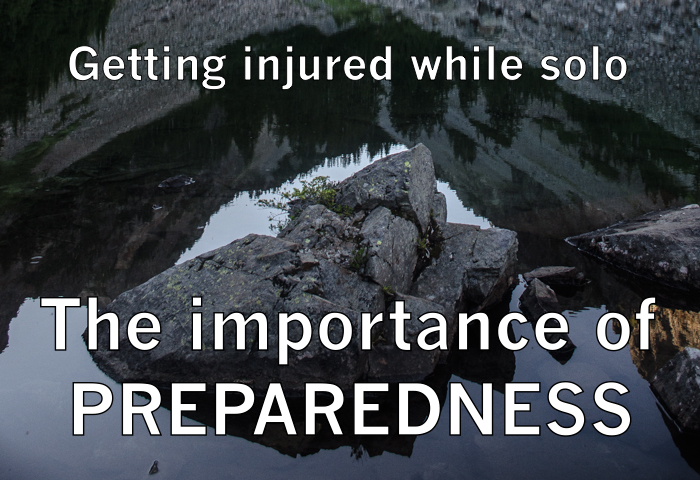It was just another Thursday night hike with friends to a lake I've been to (or beyond) plenty of times before. We stopped at the lake for a few minutes before turning for home. It was already getting dark when we started spreading out on the trail. Even though it was nearly dark it was still warm and muggy. I splashed water on my head while traversing a waterfall and was holding both trekking poles in one hand not paying attention. The fall happened quickly.
I think I slipped on a wet rock and began falling off the edge of the trail. My right arm went out to break my fall, but I landed square on a flat-topped rock, chest first. I bounced off the rock and came to rest on my back, my legs hanging off the edge of the trail, the wind knocked out of me, stuggling to breathe. The first thought that went through my head was, "No way is SAR getting called to get me off this trail on this night."
(I had passed a SAR team bringing an injured hiker down the trail while I was on my way in. Also: I was obviously not thinking clearly.)
Once I started breathing again I took stock. I was bleeding from scratches on my wrist and leg. My chest was bleeding a bit and it hurt to breathe. I found I could move with pain and started the hike out. I got back to the cars about 30 minutes after everyone else. (The final diagnosis included a minor break in my wrist and a severely bruised sternum. Two and a half months later my chest still shows a mark and there's a lump where I landed.)
As scary as all this was, it could have been much worse. Had I fallen on a pointed rock it would likely have broken ribs or the dreaded xiphoid process. If I'd rolled off the edge off the trail I'd have suffered more scratches and bruises from the short drop. Had I hit my head I have no idea what would have happened. Again, it could have been much worse.
Sometimes luck is good and sometimes it's bad. Since you have no control over luck it's better to be prepared. Even though this was just a short, familiar hike I was carrying a full set of gear that would have helped me get through the night.
(These links support moosefish.com through affiliate relationships.)
- DeLorme inReach SE - Had I needed to tell my friends or family where I was and what my condition was I could have sent a message, they could have seen my location, and I could have called for rescue.
- Adventure Medical Emergency Bivvy - The thought of spending the night on the trail without the usual comforts of camp isn't pleasant, but I could have made it work with this bag. It's super lightweight so I carry it always.
- LifeStraw - Water's heavy so I don't carry an unlimited supply, but I do carry a LifeStraw. If I can find water of any type, no matter how nasty, I can drink. (And if I'm lying next to a waterfall...)
- Puffy, gloves, and hat - Yes, end of July is when this happened. Yes, I was carrying a down jacket, snow gloves, and a fleece hat. Over-prepared? Never! Warm? Always.
- Food - If you can call bars "food." Regardless, I've always got a few old bars tucked away in my pack.
- Black Diamond Icon Headlamp - I knew I'd be hiking out in the dark so this was more operational than preparedness, but still, the best light on the market.
- Everything else in the SOL Scout Survival Kit - Why build your own kit when you can get all the necessities in one tidy package?
I've carried this gear (or some variation on it) for years and this is the closest I've ever come to needing it. I have friends who have been helicoptered off peaks and others that have spent unexpected nights out. I figure that I will some day be in the same situation. It wasn't my time on this trip, but I'll be prepared when it happens.
Will you?
(I actually don't know about the xiphoid process, but it's awfully cool to say. Xiphoid xiphoid xiphoid. Also great in Scrabble.)
